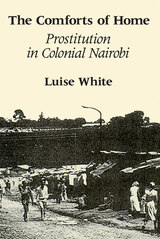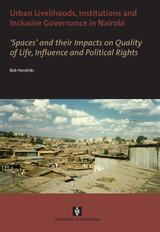4 books about Nairobi

Al Qaeda Declares War
The African Embassy Bombings and America’s Search for Justice
Tod Hoffman
University Press of New England, 2014
Three years before the events of 9/11, Osama bin Laden sent al Qaeda suicide bombers on a coordinated attack to destroy the U.S. embassies in Nairobi, Kenya, and Dar es Salaam, Tanzania. That day, August 7, 1998, more than two hundred people were killed and thousands were wounded. Responding immediately, the FBI launched the largest international investigation in its history. Within months, suspects were arrested in six countries. The U.S. Attorney for the Southern District of New York indicted twenty-two individuals, including the elusive bin Laden. In February 2001 a landmark trial of four of the accused was held in Manhattan in the shadow of the World Trade Center. Al Qaeda Declares War: The African Embassy Bombings and America’s Search for Justice explores the step-by-step procedures the United States employed in analyzing these attacks, identifying the suspects, tracking down and apprehending them, building a case, and prosecuting them. It is this case that established the legal basis for hunting down bin Laden, and the trial makes for a gripping courtroom drama, in which the robust principles of American justice confront the fanaticism of true believers. Tod Hoffman argues forcefully that the process after the 1998 incident stands in marked contrast to the illegal detention, torture, and abrogation of rights that followed 9/11. Indeed, reverberations from the African embassy bombings continue in the ongoing hunt for perpetrators still at large, and in targeted killings by drones. Al Qaeda Declares War dramatically recounts the terror and bloodshed of that day in Africa and shows that America’s search for justice afterward offers important lessons for today.
[more]

The Comforts of Home
Prostitution in Colonial Nairobi
Luise White
University of Chicago Press, 1990
"This history is . . . the first fully-fleshed story of African Nairobi in all of its complexity which foregrounds African experiences. Given the overwhelming white dominance in the written sources, it is a remarkable achievement."—Claire Robertson, International Journal of African Historical Studies
"White's book . . . takes a unique approach to a largely unexplored aspect of African History. It enhances our understanding of African social history, political economy, and gender studies. It is a book that deserves to be widely read."—Elizabeth Schmidt, American Historical Review
"White's book . . . takes a unique approach to a largely unexplored aspect of African History. It enhances our understanding of African social history, political economy, and gender studies. It is a book that deserves to be widely read."—Elizabeth Schmidt, American Historical Review
[more]

Matatu
A History of Popular Transportation in Nairobi
Kenda Mutongi
University of Chicago Press, 2017
Drive the streets of Nairobi, and you are sure to see many matatus—colorful minibuses that transport huge numbers of people around the city. Once ramshackle affairs held together with duct tape and wire, matatus today are name-brand vehicles maxed out with aftermarket detailing. They can be stately black or extravagantly colored, sporting names, slogans, or entire tableaus, with airbrushed portraits of everyone from Kanye West to Barack Obama. In this richly interdisciplinary book, Kenda Mutongi explores the history of the matatu from the 1960s to the present.
As Mutongi shows, matatus offer a window onto the socioeconomic and political conditions of late-twentieth-century Africa. In their diversity of idiosyncratic designs, they reflect multiple and divergent aspects of Kenyan life—including, for example, rapid urbanization, organized crime, entrepreneurship, social insecurity, the transition to democracy, and popular culture—at once embodying Kenya’s staggering social problems as well as the bright promises of its future. Offering a shining model of interdisciplinary analysis, Mutongi mixes historical, ethnographic, literary, linguistic, and economic approaches to tell the story of the matatu and explore the entrepreneurial aesthetics of the postcolonial world.
As Mutongi shows, matatus offer a window onto the socioeconomic and political conditions of late-twentieth-century Africa. In their diversity of idiosyncratic designs, they reflect multiple and divergent aspects of Kenyan life—including, for example, rapid urbanization, organized crime, entrepreneurship, social insecurity, the transition to democracy, and popular culture—at once embodying Kenya’s staggering social problems as well as the bright promises of its future. Offering a shining model of interdisciplinary analysis, Mutongi mixes historical, ethnographic, literary, linguistic, and economic approaches to tell the story of the matatu and explore the entrepreneurial aesthetics of the postcolonial world.
[more]

Urban Livelihoods, Institutions and Inclusive Governance in Nairobi
'Spaces' and their Impacts on Quality of Life, Influence and Political Rights
Bob Hendriks
Amsterdam University Press, 2010
This study formulates conditions for sustainable impacts of inclusive and responsive governance through ‘invited spaces’ offered by the government and ‘claimed spaces’ created by the poor. The study questions how increased contributions to poverty reduction and improvement of quality of life for Nairobi citizens can be realised in an equitable and responsible way, while contributing to development of the city and country. To adequately address this two-sided objective of economic growth and poverty reduction in the contemporary context, the study analyses both processes and impacts; moreover it examines impacts in terms of quality of life as well as influence and political rights. The study explores the individually claimed spaces of households in Nairobi’s slums, the collectively claimed spaces of hybrid mechanisms for access to peri-urban land and tenure, and the invited spaces of city-wide governance networks.
[more]
READERS
Browse our collection.
PUBLISHERS
See BiblioVault's publisher services.
STUDENT SERVICES
Files for college accessibility offices.
UChicago Accessibility Resources
home | accessibility | search | about | contact us
BiblioVault ® 2001 - 2024
The University of Chicago Press









